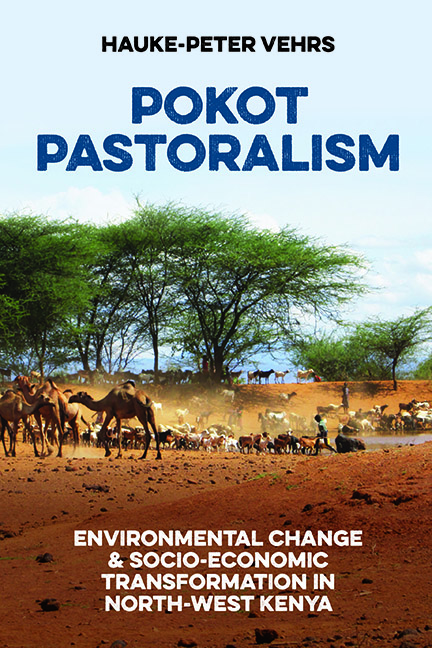Book contents
- Frontmatter
- Dedication
- Contents
- List of Illustrations
- Preface and Acknowledgements
- List of Abbreviations
- 1 Introduction
- 2 East Pokot: A Place and its People
- 3 Pokot Pastoral Livelihoods
- 4 The Paka Community
- 5 Environmental Changes in East Pokot
- 6 Socio-Ecological Transformations in the Agro-Pastoral Highlands
- 7 Ecological Change and Local Livelihoods: Scientific and Pokot Perspectives
- 8 Ecological Invasions: Agents of Socio-Ecological Transformation
- 9 Ecological Challenges and Social Transformations
- Appendix: Lists of Plant Names (Pokot–Scientific and Scientific–Pokot)
- Bibliography
- Index
- Future Rural Africa
6 - Socio-Ecological Transformations in the Agro-Pastoral Highlands
Published online by Cambridge University Press: 16 July 2022
- Frontmatter
- Dedication
- Contents
- List of Illustrations
- Preface and Acknowledgements
- List of Abbreviations
- 1 Introduction
- 2 East Pokot: A Place and its People
- 3 Pokot Pastoral Livelihoods
- 4 The Paka Community
- 5 Environmental Changes in East Pokot
- 6 Socio-Ecological Transformations in the Agro-Pastoral Highlands
- 7 Ecological Change and Local Livelihoods: Scientific and Pokot Perspectives
- 8 Ecological Invasions: Agents of Socio-Ecological Transformation
- 9 Ecological Challenges and Social Transformations
- Appendix: Lists of Plant Names (Pokot–Scientific and Scientific–Pokot)
- Bibliography
- Index
- Future Rural Africa
Summary
In the second half of the twentieth century the pastoralists in East Pokot diversified their livelihood assets over a relatively short time period, which is represented mainly by the modifications of livestock husbandry (Oesterle, 2008) and the increasing use of farming (Greiner et al., 2013; Greiner & Mwaka, 2016; Mwaka, 2014). One of the most important changes appears to be the emergence of agricultural practices in East Pokot. These range from pastoral farming in core pastoral zones with unfavourable conditions to intensive rain-fed farming in the more favourable highland areas towards the eastern and western escarpment regions.
In the eastern highlands towards Laikipia County, agriculture has evolved slowly since the mid-twentieth century, and the former dependence of livelihoods on livestock husbandry is no longer predominant. Greiner et al. (2013) describe land-use changes in the Churo highlands from pastoral modes of living towards crop cultivation and sedentarisation. In contrast to the picture of opportunistic pastoral farming in the pastoral areas, they reveal that agriculture is now the predominant mode of subsistence. Vast areas have been turned into cultivation grounds with regular fencing. Moreover, the region experienced an intensive increase in population numbers between 1979 and 2019. Agro-pastoral livelihoods have developed over time in the escarpment regions of East Pokot that still contain a few pastoral characteristics when it comes to livestock husbandry and the production and use of livestock products. However, the cultivation of maize and other crops for subsistence and revenue generation has become equally or even more important than keeping livestock.
In the following, I describe the emergence of farming and how it has developed over the past 70 years, discuss differences between agro-pastoral livelihoods in Churo and the pastoral livelihoods at Mt Paka and identify the drivers of this livelihood transformation. I conclude by looking at the relations between the land-use changes (especially related to farming) and land-cover changes in the Churo highlands against the background of the spread of Dodonaea viscosa.
Pastoral and agro-pastoral livelihoods
Ever since the formation of the pastoral Pokot in the eighteenth century, Pokot people have been differentiated by their occupation. The agro-pastoral Pokot from West Pokot County were named pi’-pa-pagh – the ‘seed people’ or ‘agriculturalists’ (pagh literally means ‘corn’ – see Beech, 1911, pp.15, 62).
- Type
- Chapter
- Information
- Pokot PastoralismEnvironmental Change and Socio-Economic Transformation in North-West Kenya, pp. 120 - 141Publisher: Boydell & BrewerPrint publication year: 2022



